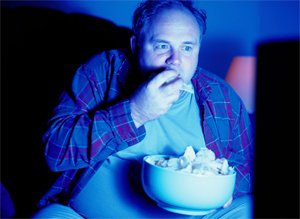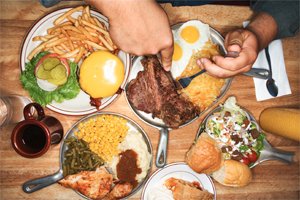Eating at Night Makes You Fat (THE MYTH)

The Myth;
It's completely obvious, when you think about it: Your level of fatassness is entirely determined by calories taken in versus calories burned. Drooling on your pillow typically isn't a very physically intensive activity, so when you pork out right before bed, you won't be using up any of those calories you just shoved down your gullet, unless your night terrors are really strenuous that week.
So clearly, eating at night is a true dieting no-no. And if what you choose to eat at night happens to be high in carbohydrates? Whew, don't even get us started on that.

The Reality:
Actually, according to a study conducted at the Hebrew University of Jerusalem, you're actually better off loading up in the evening than other times of the day. It has to do with how your body regulates when you get hungry.
The study took a bunch of police officers (because doughnuts, duh) and split them into two groups: The first group loaded up on a carb-heavy meal at night, while the second spread their carb intake out throughout the day. The researchers explained that "The idea came about from studies on Muslims during Ramadan, when they fast during the day and eat high-carbohydrate meals in the evening, that showed the secretion curve of leptin was changed." In case you're asking your screen what the hell leptin is right now, it's the hormone that tells your body it's not hungry anymore.

According to everything our mothers ever told us, the outcome should have been easy to foresee: The "doughnuts for dinner" group should have had to grease themselves up in order to squeeze into their squad cars at the end of the six-month study. But much to the contrary, the researchers found that not only had those officers not gotten fatter, they had actually lost more weight than the control group. That's because the heavy intake of carbs in the evening modified the participants' secretion of hunger hormones in such a way that they felt less hungry throughout the day, with just a single hunger peak in the evening (aka "DOUGHNUT TIME!"). The research suggests that "concentrating carbohydrate intake in the evening, especially for people at risk of developing diabetes or cardiovascular disease due to obesity" could be an effective alternative for people who have difficulty sticking with diets.
Oh, and get this. If you do eat breakfast, go big. Another study found that dieters who ate a high-carb breakfast (with dessert!) were less likely to gain back weight lost while dieting than those who ate a healthier, low-carb (and, sadly, dessertless) breakfast. It's for the same reason: A healthier breakfast is better for you, but also leads to you getting hungrier sooner. And in the long run, any diet that leaves you hungry is doomed to fail.

Yeah ri8
Nice one
Thanks
great
also do on my post
also do on my post
Nice post
nices
Nice bro
Thanks bro
Nice
Nice topic ..